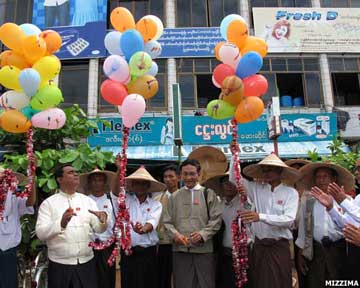The National Democratic Force (NDF) party says that all non-targeted economic sanctions on trade and investment should be lifted by the international community because they harm the livelihood of ordinary Burmese...
New Delhi (Mizzima) – The National Democratic Force (NDF) party says that all non-targeted economic sanctions on trade and investment should be lifted by the international community because they harm the livelihood of ordinary Burmese.
 ‘Three types of sanctions are found in Burma’, NDF leader Khin Maung Swe told Mizzima. ‘They are targeted sanctions, trade embargos and investment sanctions. Targeted sanctions are the freezing of assets owned by a targeted individual or organisation. However, trade embargos and investment sanctions affect average people’.
‘Three types of sanctions are found in Burma’, NDF leader Khin Maung Swe told Mizzima. ‘They are targeted sanctions, trade embargos and investment sanctions. Targeted sanctions are the freezing of assets owned by a targeted individual or organisation. However, trade embargos and investment sanctions affect average people’.
The last two sanction categories in reality hinder the development of human rights and democratic change in Burma, he said, because they hamper and delay social and civic growth in the country.
‘We cannot say they do not affect the common people. When trade embargos were imposed on Burma, the garment and textile industry were seriously affected, and it had a direct impact on the economy of our country. Non-targeted sanctions are one of the reasons for our poor economic growth, and they do not take into consideration the negative impact on ordinary people’, he said.
Another political party, the Democratic Party (Myanmar), led by veteran politician Thu Wei, advocates the end to all categories of economic sanctions.
The lifting of targeted sanctions against military leaders and their business associates could increase the chances that all political prisoners would be released, Thu Wei said.
‘I think it would be better if all these sanctions were lifted’, he told Mizzima, adding that this month he sent letters of appeal to various embassies in Rangoon.
The US government imposed an arms embargo on Burma in 1993 and imposed economic sanctions on new investments in 1997, citing human rights violations by the military regime.
Moreover, the US enacted the ‘Burma Freedom and Democracy Act 2003’ to freeze the foreign-based assets of key generals in the military regime and their cronies and imposed a visa ban on targeted individuals. Economic sanctions were renewed in May 2010.
Similarly, European Union (EU) countries imposed sanction on arms sales and transfer to Burma in 1996. It also froze foreign-based assents owned by military leaders, their family members and cronies and imposed a visa ban.
After the crackdown on the September 2007 protests, the EU cut off all aid and grants to Burma except for humanitarian assistance. The sanctions also ban importing timber, gemstones and minerals.
Many of the winning candidates of the Union Solidarity and Development Party (USDP) are included in the targeted sanction list of US and EU countries.
The National League for Democracy says it is now studying the lifting of targeted sanctions.
“The targeted sanctions imposed on the generals, their families and their cronies have nothing to do with us [average people]’, Win Tin, a prominent leader, told Mizzima. ‘We plan to study which sanctions affect the common people, and after that we will decide our policy’.
Economist Khin Maung Nyo told Mizzima that he agreed that sanctions imposed by Western countries are one of the factors that hinder economic growth but mismanagement of the domestic economy is the major factor.
‘State-level economic management, especially in macro-economic management, is very poor. We hope it will be better following the election. But I don’t believe we will see change overnight even if sanctions are lifted’, he said.
Aung Thu Nyein of the Thai-based Vahu Development Group said that if targeted sanctions and arms embargos were imposed effectively they would have little impact on ordinary people.
Meanwhile, the Association of Southeast Asian Nations (Asean) called for the lifting of sanctions imposed on Burma at a meeting in Indonesia on January 16. In a statement on January 16, ethnic political parties representing the Shan, Rakhine, Mon, Chin and Falon-Sawaw have also called for the lifting of sanctions because they hinder economic growth in states dominated by ethnic nationalities.



